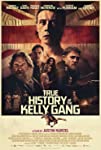Eye For Film >> Movies >> True History Of The Kelly Gang (2019) Film Review
True History Of The Kelly Gang
Reviewed by: Andrew Robertson

The essence of a good hanging is that the short stop from a long drop breaks some set of vertebrae, spine, bringing a sudden end from a sudden end. A bad hanging instead suspends, the end coming from asphyxiation, as with crucifixion, the dying aloft and not yet dead, not cleanly.
There are unclean deaths at the end of unclean lives. Ignore for a moment the camera following horses through landscapes, crimson clad from above, lit ghostly as we parallel them through stark woodland like paper puppet ponies in a shadow play, the slow loop of horse round man round fence, ignore treelines and snowlines and mist. A black hulk of wriggly tin, a beetling net-curtained skeleton. Through narrowed eyes, a narrow gap, a 'sex act', swear and spit.

What swearing. Where Carey's source novel elides, rendering obscene gerunds as 'adjectival' and borrowing that sensibility through underscore to make every s___r a palimpsest, Shaun Grant's script, Justin Kurzel's film, is more than happy to speak of country matters. I lost track of the fucking before the first belt buckle was done back up, even in Glasgow (where the film was at the Film Festival before UK general release) the language, and what language, felt like a tide, a torrent, inventive invective spilling forth like a burst dam.
In a minute we will talk (and talk!) about acting, performance, but Jed Kurzel's music (and more on that) and Karen Murphy's production design and Ari Wegner's cinematography first. Splendour that feels like it has been boxed up and shipped and left to dust and dust, scrap and scrabble made soot-black solidity, touches of homeliness, mismatched chairs, glowing cloaks, moments of shadow and light that suggest a painters care, other great splashes of colour. Consider this another outpost in the developing vernacular of drone-enabled cinematography, something now becoming distinct from crane and helicopter and instead an eye in a sky, and what skies? Rarely seen. This is a film that only once or twice looks up, and then to look back, to reflect. Shades of the colonial madness of Zama, The Revenant, Bait, I was minded of Wake In Fright for obvious reasons but also because opening shots root this so fiercely in specific place by different, potent, means.
Mean like life. Essie Davis is the somewhat-maternal Ellen Kelly; oz-punk legend Ben Corbett, a singing Russell Crowe, Charlie Hunnam's man who is police and Nicholoas Hoult's constable are authority and father figures of sorts, but reacting to them is Ned. Orlando Schwerdt is ablaze, bloodied, unbowed, still and stiff and watching, an astonishing performance from a young actor, one whose stance and poise are matched by the elder Ned, George Mackay.
Mackay bent over backwards for this. In Q&A at GFF2020 he talked about the months of effort to become, god, it's whipstrong and headsmart, bared knuckles, teeth, delight and devilment. It's not just in moments like the view from behind the monitor, the bloodied sheet in a mansion, among hanging noodles with the delicacy of Thomasin McKenzie, in snow, mud, blood, despair. It may be one of the finest performances you see this year, and see it you should.
There are so many things to praise. I am ever optimistic about adaptations, even those for works considered unfilmable. An artefact of the presentation of the credits minded me of McCarthy's Blood Meridian, a work long considered impossible to render, but Kurzel et al have turned a literary novel which leverages artefacts of text and curation and authorship (corrected) into a film which leverages artefacts of cinema and curation and authorship (corrected). There are lines lifted wholecloth from the film, others cut, we were told, for budgetary reasons after months of effort. There is one moment where a body still warm found by someone is instead replaced with that act of unmaking seen in one of the few scenes in which Ned does not appear. The rhythm of language on page becomes instead the rattle of chain, the chuffing of choo choo chewed through in a cellar where a pillar cleaves through a billiard table and the cranked camera of a locomotive's implacable approach, timelapse over timber, the rhythms of writing become a family of filmic flicker.
Accents abound, all part of a scape of sound that includes the cast themselves as punk band (and credible too), bullroar from purloined ring and stringy stillness, that which is as was on the page becomes here red, said, each of those underscored uncounted shorter sharper sounds. It is a dry high-water mark of literary adaptation, conflation, confection, sharpness, vigour. Where the pen lopes languid this is staccato. Ned's apprenticeship is not a slow holding of horses but a moment of baptismal ichorous crimson discord.
Where the book binds boxes of papers from moments of reflection here three great chapters Boy Man Monitor each made of something apposite, carved wood, bloody canvas, scratched steel. MacKay too binds these, these moments. You'll notice how few women there are, blackfellas are mentioned but the novel's trackers are omitted; this is a different lens upon a similar story. There is the compelling case that the first the English colonised were themselves, but that history (as with many others) may be different from a certain point of view. This is a film with a good ear, a good eye, and it holds them both close, in ways its source(s) do not, or deny, and it is perhaps all the more powerful for it.
The Kellys were Irish, and though the film changes the way some of their secrets are transmitted and when it carries with it that banshee howl, restitution against institution and the vicissitudes Victoria visited. The source novel is literary, prize-winning, cherished, and if we boil this down to does this do both justice and should you see it yes I said yes.
Reviewed on: 28 Feb 2020


















